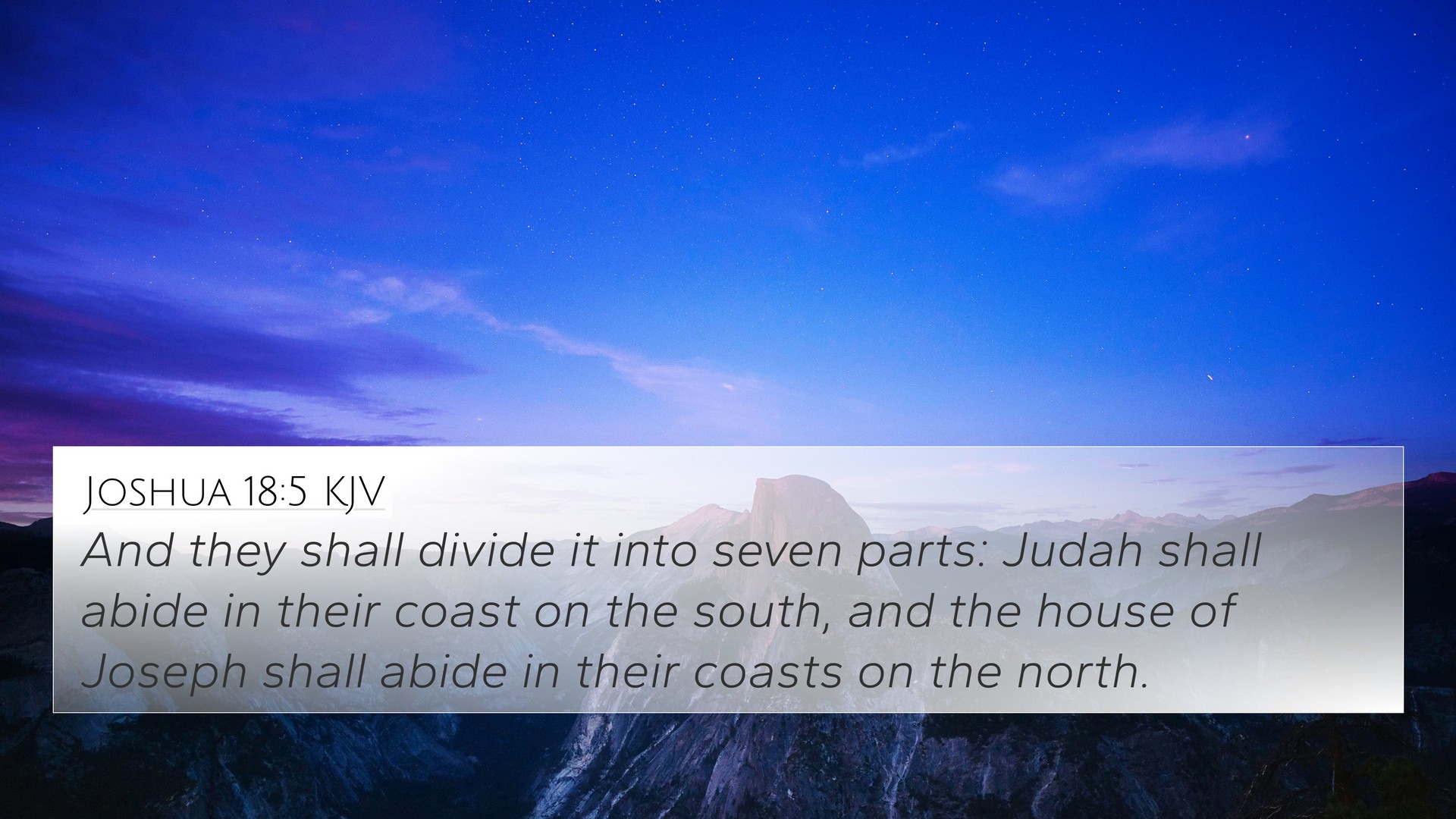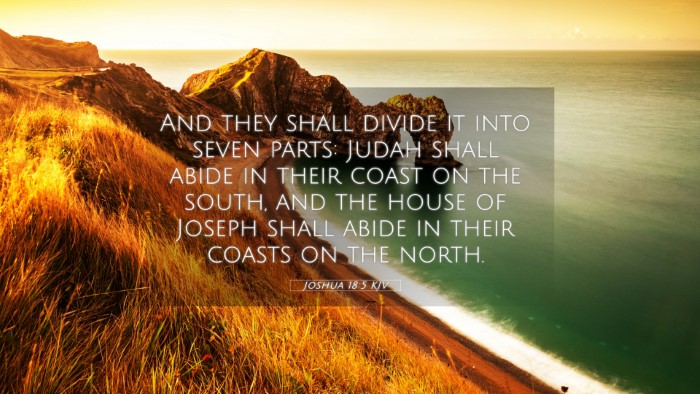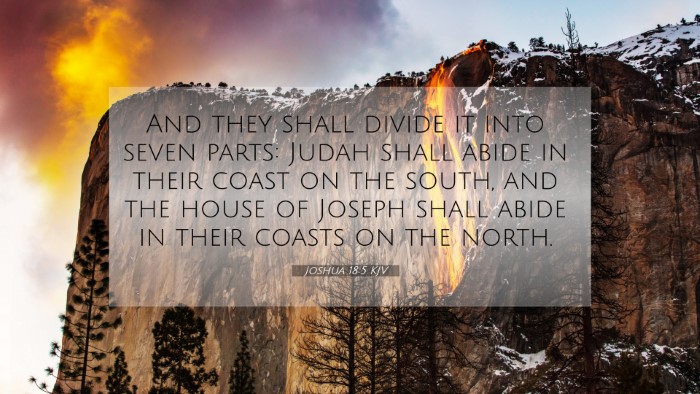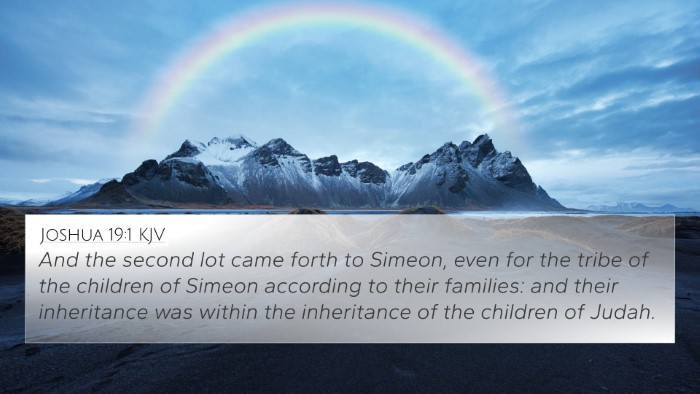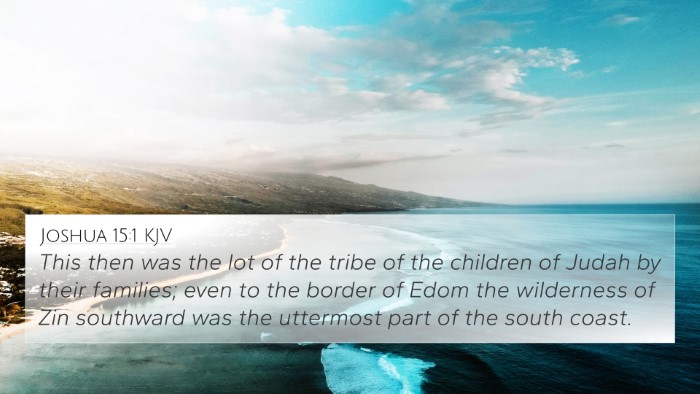Understanding Joshua 18:5
Verse: "And they shall divide it into seven parts: Judah shall abide in their coast on the south, and the house of Joseph shall abide in their coasts on the north." (Joshua 18:5)
Summary of Meaning
The verse Joshua 18:5 marks a significant moment in the distribution of the Promised Land among the tribes of Israel. According to the biblical narrative, this distribution follows the conquest of Canaan under the leadership of Joshua. The mention of dividing the land into seven parts underscores the systematic approach that was taken to ensure fair and equitable distribution to all tribes.
This verse explicitly identifies Judah and Joseph as key tribes that would receive their portions, reflecting their prominence within the Israelite community. Judah's territory was located in the south, while the house of Joseph, which includes Ephraim and Manasseh, occupied the northern parts. This demarcation illustrates not only the geographical allocation but also serves as a reminder of the tribal identities and relationships that were crucial for the nation of Israel.
Commentary Insights
-
Matthew Henry:
Henry highlights the importance of this division as a fulfillment of God’s promises to the patriarchs. The orderly division of land signifies God’s providence and faithfulness in guiding His people to possess their heritage. Moreover, it is a reminder that all blessings come from God who allocates roles and responsibilities to each tribe.
-
Albert Barnes:
Barnes emphasizes the strategic significance of land division. He explains that the location of Judah and Joseph's territories was strategically chosen to position these tribes advantageously within the broader landscape of Canaan, which would influence their military and economic strength moving forward.
-
Adam Clarke:
Clarke discusses the implications of land divisions in relation to Israel's destiny. He points out that land ownership was central to Israelite identity and their covenantal relationship with God. This distribution ties the fulfillment of God’s covenant promise to the historical and geographical realities of the tribes’ identities.
Bible Verse Cross-References
The following Bible verses provide context and connection to Joshua 18:5 through various themes such as land inheritance, tribal divisions, and fulfillment of God's promises:
- Genesis 49:10: "The scepter shall not depart from Judah..." - Relating to Judah's leadership role.
- Numbers 26:53-56: "Unto these the land shall be divided for an inheritance..." - Discussing the allocation of land to tribes.
- Deuteronomy 1:36: "Caleb the son of Jephunneh... shall see it, and to him and his children I am given the land..." - Emphasizing inheritance as a promise.
- Joshua 14:4: "For the children of Joseph were two tribes, Manasseh and Ephraim..." - Clarifying the division among Joseph’s progeny.
- 1 Chronicles 5:2: "For Judah prevailed above his brethren..." - Establishing Judah’s preeminence in Israel's history.
- Zechariah 10:6: "I will strengthen the house of Judah..." - Referring to God's commitment to Judah.
- Luke 3:33: "Which was the son of Amminadab, which was the son of Admin..." - The genealogy connecting to the tribal heritage.
Connecting Themes
This verse showcases significant themes within the wider biblical narrative. The idea of inheritance and division is a recurrent theme throughout Scripture. The consistent references to land illustrate God's faithfulness to His people, while simultaneously highlighting individual tribal identities and their respective destinies:
- Theme of divine promise and covenant fulfillment.
- Identity and purpose of Israel's tribes.
- God's sovereignty in guiding history and making provisions for His people.
- The role of jurisprudence in the communal life of the Israelites.
Applying the Verse Today
Understanding Joshua 18:5 can provide valuable insights into how we view our own identities and roles within a community. Just as the tribes of Israel were given specific portions and responsibilities, we too have roles in our families and communities. This encourages us to embrace our responsibilities and to live according to the purposes God has for us.
Moreover, it serves as a reminder of the importance of God’s promises in our lives. Truly, what happened in the history of Israel can resonate with our understanding of God’s faithfulness and covenant with humanity. This connectivity invites believers to reflect on their personal inheritance in Christ.
Conclusion
Joshua 18:5 is a vital link to the overall narrative of Israel’s settlement in the Promised Land and invites deeper reflection on themes of identity, heritage, and divine promise. Through cross-referencing, believers can see how this verse resonates throughout Scripture, emphasizing the interconnectedness of Biblical texts that guide our understanding of God’s character and His workings among His people.
